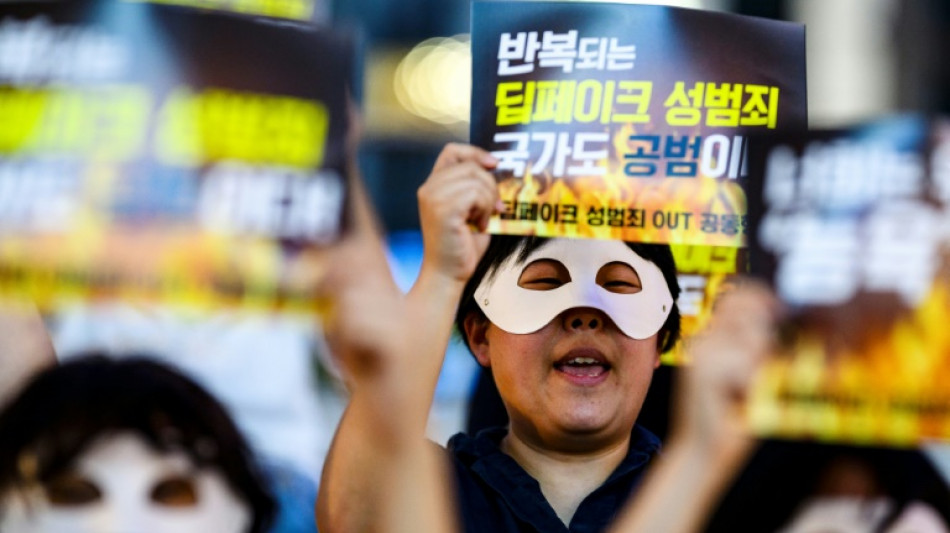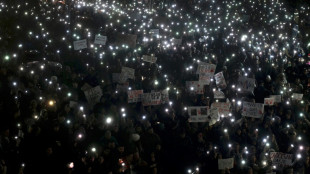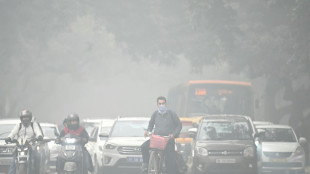
-
 Global stocks mostly higher in thin pre-Christmas trade
Global stocks mostly higher in thin pre-Christmas trade
-
NASA probe makes closest ever pass by the Sun

-
 Global stocks mostly rise in thin pre-Christmas trade
Global stocks mostly rise in thin pre-Christmas trade
-
Global stocks mostly rise after US tech rally

-
 Investors swoop in to save German flying taxi startup
Investors swoop in to save German flying taxi startup
-
Saving the mysterious African manatee at Cameroon hotspot

-
 The tsunami detection buoys safeguarding lives in Thailand
The tsunami detection buoys safeguarding lives in Thailand
-
Asian stocks mostly up after US tech rally

-
 US panel could not reach consensus on US-Japan steel deal: Nippon
US panel could not reach consensus on US-Japan steel deal: Nippon
-
The real-life violence that inspired South Korea's 'Squid Game'

-
 El Salvador Congress votes to end ban on metal mining
El Salvador Congress votes to end ban on metal mining
-
Five things to know about Panama Canal, in Trump's sights

-
 Mixed day for global stocks as market hopes for 'Santa Claus rally'
Mixed day for global stocks as market hopes for 'Santa Claus rally'
-
Trump's TikTok love raises stakes in battle over app's fate

-
 European, US markets wobble awaiting Santa rally
European, US markets wobble awaiting Santa rally
-
NASA solar probe to make its closest ever pass of Sun

-
 Volkswagen boss hails cost-cutting deal but shares fall
Volkswagen boss hails cost-cutting deal but shares fall
-
Sweden says China blocked prosecutors' probe of ship linked to cut cables

-
 UK economy stagnant in third quarter in fresh setback
UK economy stagnant in third quarter in fresh setback
-
Global stock markets edge higher as US inflation eases rate fears

-
 US probes China chip industry on 'anticompetitive' concerns
US probes China chip industry on 'anticompetitive' concerns
-
Mobile cinema brings Tunisians big screen experience

-
 Honda and Nissan to launch merger talks
Honda and Nissan to launch merger talks
-
Asian markets track Wall St rally as US inflation eases rate fears

-
 Honda and Nissan expected to begin merger talks
Honda and Nissan expected to begin merger talks
-
Asian markets track Wall St rally as US inflation eases rate worries

-
 Trump vows to 'stop transgender lunacy' as a top priority
Trump vows to 'stop transgender lunacy' as a top priority
-
Beyond Work Unveils Next-Generation Memory-Augmented AI Agent (MATRIX) for Enterprise Document Intelligence

-
 Sweet smell of success for niche perfumes
Sweet smell of success for niche perfumes
-
'Finally, we made it!': Ho Chi Minh City celebrates first metro

-
 Tunisia women herb harvesters struggle with drought and heat
Tunisia women herb harvesters struggle with drought and heat
-
Trump threatens to take back control of Panama Canal

-
 Secretive game developer codes hit 'Balatro' in Canadian prairie province
Secretive game developer codes hit 'Balatro' in Canadian prairie province
-
Stellantis backtracks on plan to lay off 1,100 at US Jeep plant

-
 Banned Russian skater Valieva stars at Moscow ice gala
Banned Russian skater Valieva stars at Moscow ice gala
-
Biden signs funding bill to avert government shutdown

-
 Sorrow and fury in German town after Christmas market attack
Sorrow and fury in German town after Christmas market attack
-
France's most powerful nuclear reactor finally comes on stream

-
 Sierra Leone student tackles toxic air pollution
Sierra Leone student tackles toxic air pollution
-
Amazon says US strike caused 'no disruptions'

-
 Qualcomm scores key win in licensing dispute with Arm
Qualcomm scores key win in licensing dispute with Arm
-
Scientists observe 'negative time' in quantum experiments

-
 US approves first drug treatment for sleep apnea
US approves first drug treatment for sleep apnea
-
Amazon expects no disruptions as US strike goes into 2nd day

-
 US confirms billions in chips funds to Samsung, Texas Instruments
US confirms billions in chips funds to Samsung, Texas Instruments
-
Wall Street rebounds despite US inflation ticking higher

-
 Serbia schools to shut amid new protests over station collapse
Serbia schools to shut amid new protests over station collapse
-
Argentina's dollar craze cools under greenback-loving Milei

-
 'Dark lull' in German energy transition sparks political debate
'Dark lull' in German energy transition sparks political debate
-
No longer Assad's mouthpiece, Syrian media face uncertainty


Deepfake porn crisis batters South Korea schools
After South Korean authorities uncovered a sprawling network of AI deepfake porn Telegram chatrooms targeting schools and universities, teenage activist Bang Seo-yoon began collecting testimony of abuse from victims.
Many of the cases she documented followed the same pattern: schoolboys steal innocuous selfies from private Instagram accounts and create explicit images to share in the chat rooms, specifically to humiliate female classmates -- or even teachers.
Super-wired South Korea, with the world's fastest average internet speeds, has long battled sexual cyber violence, but experts say a toxic combination of Telegram, AI tech, and lax laws has supercharged the issue -- and it is tearing through the country's schools.
"It's not just the harm caused by the deepfake itself, but the spread of those videos among acquaintances that is even more humiliating and painful," Bang, 18, told AFP.
She has received thousands of reports from devastated victims since authorities in August found the first such Telegram chatrooms, typically set up within a school or university to prey on female students and staff.
Most perpetrators are teens, police say.
Deepfake prevalence is increasing exponentially globally, industry data shows, up 500 percent on year in 2023, cybersecurity startup Security Hero estimates, with 99 percent of victims women -- typically famous singers and actresses.
But while celebrities have powerful backers to protect them -- the K-pop agency behind girlband NewJeans recently took legal action against deepfake porn -- many ordinary victims are struggling to get justice, activists say.
- 'Live in fear' -
Prosecution rates are woeful: between 2021 and July this year, 793 deepfake crimes were reported but only 16 people were arrested and prosecuted, according to police data obtained by a lawmaker.
After news of the chat rooms spread, complaints surged, with 118 cases reported in just five days in late August, and seven people arrested amid a police crackdown.
But six out of seven alleged perpetrators were teenagers, police say, which complicates prosecutions as South Korean courts rarely issue arrest warrants for minors.
The chatrooms, multiple of which AFP attempted to join before being removed by moderators, have lewd names such as "the lonely masturbator" and rules requiring members to post photos of women they wish to see "punished".
Victims find themselves "sexually insulted and mocked by their classmates in online spaces", Kang Myeong-suk, head of victim support at the Women's Human Rights Institute of Korea told AFP.
"But the perpetrators often face no consequences," she said, adding that victims now "live in fear of where their manipulated images might be distributed by those around them".
"Some online comments say the victims should 'get over it' as these deepfake images are not even real," Kang said.
"But just because manipulated images aren't real doesn't mean the pain the victims endure is any less genuine."
- Victim blaming -
While overall crime rates in South Korea are generally low, the country has long suffered from an epidemic of spy-cam crimes, which led to major protests in 2018 inspired by the global #MeToo movement, eventually forcing lawmakers to strengthen laws.
Even so "the penalties issued are often trivial, like fines or probation, which are disproportionate to the gravity of the offenses", professor Yoon Kim Ji-young told AFP.
There have also been Telegram porn scandals before, most notably in 2020 when a group blackmailing women and girls to make sexual content for paid chatrooms was uncovered. The ringleader was jailed.
But things have not improved.
President Yoon Suk Yeol's dismissive views on feminism -- which he has blamed for the country's low birthrate -- have signalled to men it is "okay to be hostile or discriminatory towards women", Yoon Kim said.
South Korean police blame low prosecution rates on Telegram, which is famed for its reluctance to cooperate with authorities. Its founder was recently arrested in France for failing to curb illegal content on the app.
But one victim of a 2021 deepfake porn incident told AFP that this was no excuse -- many victims manage to identify their attackers themselves simply by determined sleuthing.
The victim, who requested anonymity, said it had been a "huge trauma" to bring her assailant to justice after she was attacked in 2021 with a barrage of Telegram messages containing deepfake images showing her being sexually assaulted.
Her attacker was a fellow student at the prestigious Seoul National University, who she had rarely interacted with but always thought was "gentle".
"It was hard to accept," she said, adding police required her to collect all the evidence herself, then she had to lobby hard for a trial, which is now ongoing.
"The world I thought I knew completely collapsed," she said in a letter she plans to submit to the court on September 26.
"No one should be treated as an object or used as a means to compensate for the inferiority complexes of individuals like the defendant, simply because they are women."
P.Schmidt--CPN



